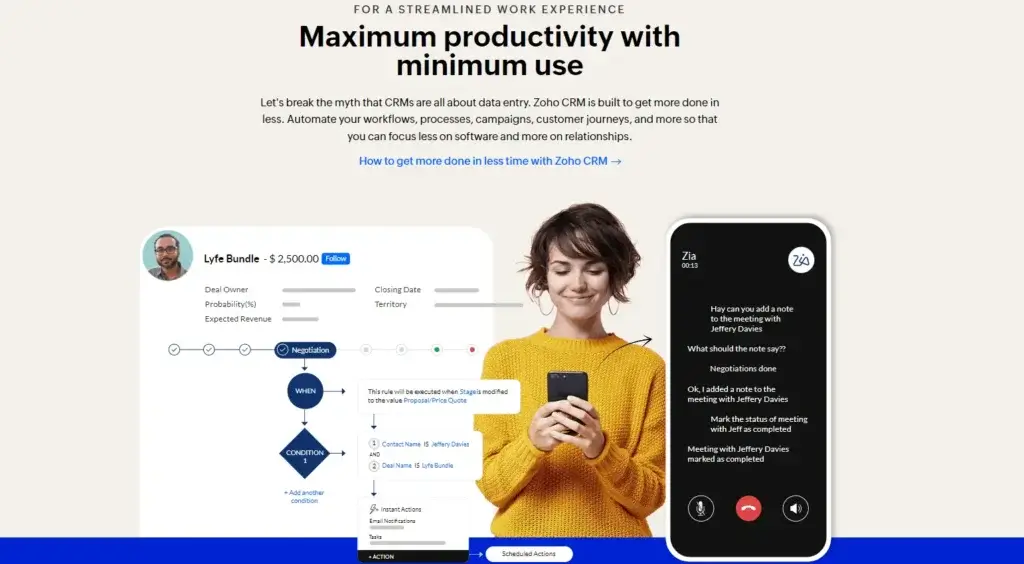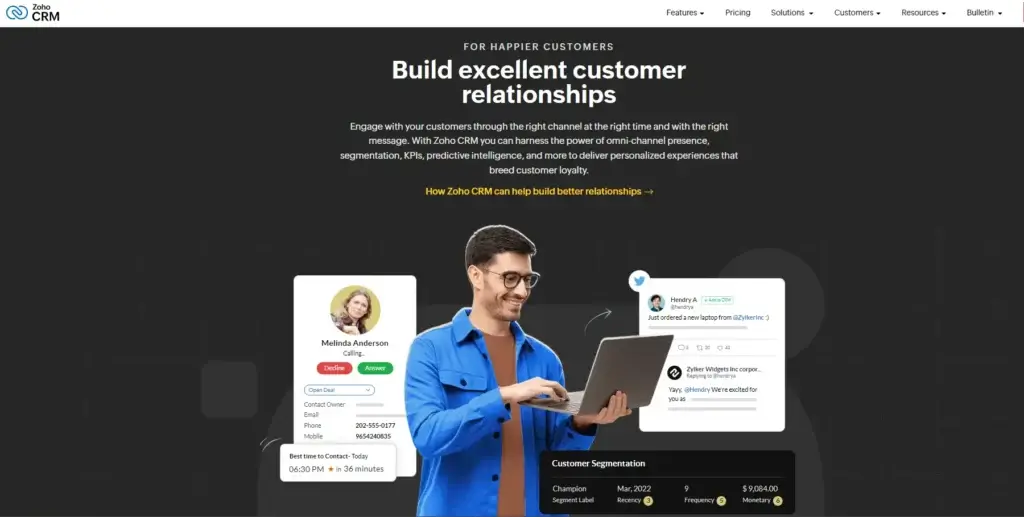Introduction
Zoho CRM is one of the most well-known names in this space. It offers a powerful suite of tools designed to help businesses streamline sales processes, improve customer engagement, and make smarter decisions with real-time data.
But with so many CRM platforms available today, how do you know if this is the right one for your business?
This review is here to help. 🎯
We’ll take a deep dive into everything you need to know, from its key features and benefits to pricing, real-user feedback, and how it stacks up against the competition. Whether you’re brand new to CRM tools or looking to switch from another platform, this guide will give you a clear, no-fluff breakdown of what this system can really do.
Key Features
Zoho CRM’s Software Specification
When choosing a CRM, you need more than just contact management. You want something that saves time, helps your team sell smarter, and adapts as your business grows.
Here’s where this platform really shines:
1. Lead and Contact Management 🧑💼📇
At its core, every CRM should help you keep track of leads, prospects, and customers. But here, it goes further.
You can:
- Capture leads from web forms, emails, chat, and social media, automatically
- Score leads based on engagement, demographics, or custom rules
- Create rich customer profiles with detailed contact history and communication logs
- Assign leads to sales reps based on territory, workload, or custom logic
Everything is centralized, searchable, and customizable, so your sales team always knows who to talk to, when, and why.
2. Sales Automation That Actually Works ⚙️💼
Automation is no longer a “nice-to-have”, it’s a must. This platform gives you powerful automation without the headache.
Use Blueprints to create step-by-step sales processes. Automate follow-ups, status updates, task assignments, and even quote generation.
And it’s not just about time savings, it’s about consistency. Automation ensures your sales process runs the same way every time, no matter who’s running it.
You’ll close deals faster and reduce the risk of human error, all while giving your team more time to sell.
3. Real-Time Analytics and Dashboards 📊🔍
Forget digging through spreadsheets. You’ll get clean, visual dashboards that tell you exactly what’s going on in your sales pipeline.
Key highlights:
- Track KPIs like win rates, deal velocity, pipeline value, and more
- Create custom reports for sales, marketing, and support teams
- Use AI-powered suggestions from Zia, your built-in smart assistant, to spot trends or anomalies
- Share reports instantly with team members or managers
If you’re serious about making data-backed decisions, this CRM makes it easier than ever.
4. Advanced Customization Options 🧱🎨
Every business is different, and your CRM should reflect that.
With Canvas, you can fully customize how each module looks and behaves. Change layouts, rearrange sections, or create entirely new views with drag-and-drop simplicity. No coding needed.
You can also customize:
- Fields, modules, and workflows
- User roles and permissions
- Validation rules and automation triggers
- Notifications, scoring rules, and layouts
Whether you’re in retail, real estate, SaaS, or services, this CRM can be molded to fit your exact needs.
5. Seamless Integration with the Zoho Ecosystem 🔗🌐
If you already use tools like Zoho Books, Zoho Desk, or Zoho Campaigns, integration is seamless. But even if you don’t, it works well with:
- Google Workspace (Gmail, Calendar, Drive)
- Microsoft 365
- Slack, Zoom, Mailchimp, and over 800+ other apps via Zoho Marketplace
You don’t have to switch platforms. You just connect the dots, and watch your workflow become a lot more efficient.
6. Mobile CRM with Full Functionality 📱🚀
Working from your phone? No problem.
The mobile app isn’t just a watered-down version. You can:
- View and update deals, tasks, and contacts on the go
- Access dashboards and reports
- Use voice commands with Zia to log calls or get quick insights
- Even work offline, changes sync when you’re back online
For remote teams and reps in the field, it’s a total game changer.
7. Expand Capabilities with Zoho Marketplace 🧩🛍️
Need something more niche? Head over to the Zoho Marketplace, where you can install prebuilt extensions and integrations for everything from accounting to SMS, event management, or eCommerce.
If you have a dev team, you can also build your own extensions with Zoho’s APIs and developer tools.
In short, you’re never boxed in.

Pros and Cons
Benefits of Using Zoho CRM
Positive
✅ Extremely Customizable
✅ Feature-Rich at Every Price Point
✅ Seamless Integration with Zoho Suite and Beyond
✅ Mobile CRM That’s Actually Useful
Negative
❌ Steeper Learning Curve
❌ UI Feels Dated in Some Areas
❌ Support Quality Can Vary by Region and Plan
❌ Initial Setup Requires Planning
Every CRM platform has its strengths and its limitations. The key is understanding how they align with your business needs.
Here’s a clear look at what works well and what might require extra attention:
✅ Pros
1. Extremely Customizable
From fields and layouts to workflows and modules, you can tailor the platform to fit your unique processes. Whether you’re a solo entrepreneur or a large team with multiple departments, it adapts to how you work, not the other way around.
2. Feature-Rich at Every Price Point
Even the lower-tier plans come packed with powerful tools like automation, analytics, and lead scoring. You don’t have to break the bank to get real value.
3. Seamless Integration with Zoho Suite and Beyond
If you’re already using Zoho tools (like Books, Desk, or Campaigns), you’ll love how effortlessly they work together. Plus, with integrations across Google Workspace, Microsoft 365, and Slack, you can plug into the tools you already rely on.
4. Mobile CRM That’s Actually Useful
Many CRMs offer mobile apps, but few make them this functional. You can manage leads, update deals, run reports, and even talk to the AI assistant, Zia, all while on the move.
❌ Cons
1. Steeper Learning Curve for Advanced Features
The basics are easy to use, but setting up complex automation or custom modules can take time, especially if you’re not familiar with CRMs.
2. UI Feels Dated in Some Areas
While Zoho has made big improvements (especially with Canvas), parts of the interface still feel slightly clunky compared to modern, design-forward CRMs like HubSpot or monday CRM.
3. Support Quality Can Vary by Region and Plan
Some users report delays or inconsistent help when using basic support channels. Opting for premium support (especially on Enterprise or Ultimate plans) solves most of these issues.
4. Initial Setup Requires Planning
Because the platform is so flexible, it’s easy to get lost in customization. To make the most of it, you’ll want to map out your workflows before diving in.
Benefits of Using This CRM 🌟
When used correctly, this platform doesn’t just organize your contacts; it transforms the way you manage customer relationships across the board.
Here’s how it helps you grow smarter, faster, and more strategically:
🚀 More Sales with Less Manual Work
Sales reps spend too much time on data entry and admin. Here, automation handles lead assignments, follow-ups, notifications, and even quotes, so your team can focus on closing.
Bonus: With Zia, the built-in AI, you’ll get real-time insights and suggestions to help prioritize high-value leads and avoid missed opportunities.
🧠 Smarter Decisions with Built-In Intelligence
Analytics isn’t just for data geeks anymore. The visual dashboards let you see what’s working and what’s not, across sales, marketing, and customer service.
From tracking conversion rates to measuring deal velocity, it gives you the numbers you need to make better, faster decisions.
🤝 Better Collaboration Across Teams
Your sales, marketing, and support teams can work together from the same platform, no more silos. Share notes, assign tasks, tag teammates, and track every interaction in one place.
When everyone’s working with the same information, you deliver a better experience to every customer.
🔒 Secure and Compliant from Day One
Whether you’re handling sensitive client data or operating across borders, security matters. The platform is GDPR-compliant, ISO-certified, and includes enterprise-grade security features like IP restrictions, audit logs, and two-factor authentication.
So you don’t just gain efficiency, you also gain peace of mind.

User Experience
User Interface and Experience
Choosing a CRM isn’t just about features, it’s about how it feels to use every day. A great user experience can mean the difference between your team adopting the system or abandoning it.
So, how does this platform stack up when it comes to real, day-to-day usability?
Clean Interface That Gets the Job Done 🧭
The overall layout is intuitive once you get familiar with the system. The main modules, Leads, Contacts, Deals, and Tasks, are laid out clearly in the top navigation bar. You can drag, filter, and search with ease.
But here’s the real value: you can customize the entire interface.
With Canvas, you’re not stuck with default layouts. You can tailor views based on team roles, job functions, or personal preferences. Whether your sales rep needs a quick-view deal pipeline or your support team wants a case history front and center, you can build it, no coding required.
Some parts of the UI may still feel a bit “corporate” or dated, but with Canvas and a few tweaks, it becomes a much smoother experience.
Mobile App That Means Business 📲
The mobile version is a true productivity tool, not just a stripped-down add-on.
On your phone or tablet, you can:
- View and update leads and deals in real-time
- Log calls, take voice notes, or scan business cards
- Get real-time alerts and reminders
- Use Zia (the AI assistant) to ask for reports or log updates by voice
Even better, it works offline. Changes you make while traveling or in poor signal areas will sync automatically when you’re back online. If your team spends time in the field, this is a massive advantage.
Support and Resources When You Need Help 🛟
Let’s be honest, any powerful CRM will take time to master.
The good news? There’s a robust support ecosystem to help you out:
- A detailed Help Center with how-to guides and tutorials
- Active community forums where users share tips and answer questions
- Email and live chat support (response times vary by plan)
- Webinars, onboarding sessions, and even Zoho Concierge for hands-on help on premium plans
If you’re on an Enterprise or Ultimate plan, you can also opt for 24/7 support and dedicated account managers, which can be a big win for scaling teams.
Reliable Performance You Can Count On ⚙️
Stability matters, especially when your CRM is the nerve center of your business.
This platform is cloud-based, secure, and consistently fast. In our testing and from recent user reports, system uptime is excellent, typically above 99.9%. Load times are fast across both desktop and mobile, and data sync is reliable, even with complex automation and large databases.
You also get audit logs, user access controls, and permission-based roles, so you have control over what users can see or do.
What Users Are Saying 💬
Real-world feedback paints a clear picture: most users appreciate the flexibility, powerful automation, and deep customization. But they also mention a few caveats:
“It’s a super flexible system once you know your way around it, but the learning curve is real if you’ve never used a CRM before.”
Verified User, G2 Review
“Love the mobile app, I can update deals and call notes right after client meetings. It saves me so much admin time.”
Real Estate Consultant
A Few Learning Curves, but Worth It 🧠
No platform is perfect. While the sheer amount of features can feel overwhelming at first, the trick is to start small. Focus on leads, deals, and email templates first, then layer in automation and custom modules as your team gets comfortable.
And remember: the more time you invest in setting it up right, the more time (and money) it’ll save you in the long run.
Business size fit
Zoho CRM for Different Business Sizes
Whether you’re a solo founder, a fast-growing mid-market team, or a large-scale enterprise, the platform is built to scale with you. Here’s how Zoho CRM fits each stage of business:
| Business Size | How It Fits Your Needs | Recommended Features |
| 🏠 Small Businesses & Startups | Easy setup, affordable pricing, and enough tools to get organized fast. | Lead management, email templates, basic automation |
| 🏢 Medium-Sized Teams | Great balance of features, flexibility, and automation without overwhelming complexity. | Blueprint workflows, analytics, role-based access |
| 🏢🏢 Large Enterprises | Enterprise-level control, deep customization, and powerful integrations. | Zia AI, CommandCenter, multi-team management, sandboxing |
Pricing and Plans
How much does Zoho CRM cost?
| Plan | Price (per user/month, billed annually) | Best For | Key Features |
| 🆓 Free | $0 | Freelancers, very small teams | Basic contact management, tasks, limited workflows |
| ⚙️ Standard | $14 | Small sales teams | Scoring rules, custom reports, mass emails |
| 🚀 Professional | $23 | Growing businesses | Blueprint process builder, inventory, validation rules |
| 🧠 Enterprise | $40 | Midsize to large teams | Zia AI, multi-user portals, CommandCenter, Canvas customization |
| 🏢 Ultimate | $52 | Data-driven, enterprise-level teams | Advanced BI, enhanced storage, sandbox environment |
Security and Compliance
Protection for Your Data
When it comes to managing customer data, security isn’t just a feature; it’s a foundation. Zoho CRM is built with privacy, control, and trust at its core, giving you the tools to protect sensitive information and meet global compliance standards.
Here’s how your data stays safe:
-
End-to-end encryption protects all data at rest and in transit, so whether you’re uploading documents or sending emails, it’s all secure.
-
Two-factor authentication (2FA) adds an extra layer of login protection to prevent unauthorized access.
-
Role-based access controls ensure your team only sees what they need to, keeping sensitive information tightly controlled.
-
IP restrictions and audit logs let you track access and limit logins to approved locations and devices.
-
Data backup and redundancy are built in, minimizing the risk of data loss or service downtime.
-
Compliance with GDPR, CCPA, and HIPAA-ready controls helps businesses operate safely across different industries and regions.
-
Certified with standards like ISO 27001, SOC 2 Type II, and GDPR, the platform proves its commitment to enterprise-grade security.
Whether you’re a startup or an enterprise, with Zoho CRM, you can confidently manage customer relationships, knowing your CRM is built on solid security.
Conclusion
Final thoughts
Choosing a platform like this isn’t just about logging contacts or sending emails. It’s about building a system that supports your workflow, fuels your growth, and helps your team perform at their best every step of the way.
🔍 What You’re Really Getting
Here’s a quick rundown of what Zoho CRM brings to the table:
-
A centralized hub for managing leads, deals, contacts, and activities
-
Time-saving automation that reduces manual tasks and improves consistency
-
Built-in AI tools like Zia to help you prioritize the right opportunities
-
Real-time dashboards to track KPIs, sales performance, and team activity
-
A scalable system designed to grow with your business, whether you’re 3 users or 300
Once you customize it to fit your processes, Zoho CRM becomes more than a CRM; it becomes your sales command center.
👥 Is Zoho CRM the Right Fit for You?
If you’re a small business just starting out, it might feel like you’re stepping into a more advanced tool than you need. But that’s not a bad thing.
You can start simple and expand as your needs evolve. And if you’re already dealing with complex pipelines, multiple teams, or cross-functional workflows, Zoho CRM is built to handle that without needing third-party tools or costly add-ons.
Need more comparisons? Check out our top CRM software guide to see how it stacks up against Salesforce, HubSpot, monday CRM, and others.
🧠 Final Word from a CRM Expert
After working with dozens of CRMs over the years, here’s what I’ve learned: the best CRM is the one your team actually uses, the one that adapts to your processes instead of forcing you to change everything.
Zoho CRM might take a little time to master. But once it’s up and running, it’s incredibly powerful, deeply customizable, and ready to scale with you.
So if you’re looking for a future-ready CRM that combines flexibility, intelligence, and value, this might be exactly what you’ve been searching for.
Have more questions
Frequently Asked Questions
1. Does Zoho CRM offer AI-based forecasting or pipeline intelligence?
Yes, through Zia AI, you get predictive insights like deal closure probability, lead conversion scoring, anomaly detection, and sentiment analysis. It helps sales teams make data-driven decisions and forecast revenue more accurately.
2. Can Zoho CRM be used for marketing automation?
While it’s primarily sales-focused, it includes several marketing features like email campaigns, autoresponders, web form capture, and lead scoring. For more advanced automation, you can integrate it seamlessly with Zoho Marketing Automation or Zoho Campaigns.
3. What’s the difference between Zoho CRM and Zoho Bigin?
Zoho Bigin is a lightweight CRM designed for micro-businesses and solopreneurs. It’s easier to set up but limited in features. Zoho CRM is more robust and scalable, offering deeper automation, customization, and analytics for growing teams.
4. How does Zoho CRM handle multilingual or multi-currency businesses?
It supports 25+ languages and allows you to operate in multiple currencies, making it ideal for global teams. You can set base currencies, use currency conversion rates, and localize communication templates.
5. Is Zoho CRM suitable for B2C businesses, or just B2B?
It works for both. While many CRMs lean toward B2B, Zoho CRM includes tools that make it friendly for B2C models too, like lead segmentation, omnichannel communication, appointment scheduling, and customer journey mapping.
6. Can you build customer portals or client access areas with Zoho CRM?
Yes, on higher plans (like Enterprise), you can set up multi-user portals. These let clients or vendors log in, view shared data (like invoices or support tickets), and collaborate securely with your team.
7. Is there a way to sync Zoho CRM with WhatsApp or SMS platforms?
Yes. Through Zoho Marketplace integrations and third-party tools like Twilio or Clickatell, you can add WhatsApp messaging, SMS campaigns, and two-way texting directly into your CRM workflows.
8. What’s Canvas in Zoho CRM, and why does it matter?
Canvas is a visual editor that lets you completely redesign how your CRM looks, with no code. You can change layouts, add branding, highlight key fields, and build a more user-friendly interface that aligns with your workflow.
9. Does Zoho CRM offer any sandbox or testing environment?
Yes, Ultimate plan users get access to a sandbox environment. This lets you test changes (like workflows or integrations) without affecting live data, a must-have for complex setups or enterprise teams.
10. Can Zoho CRM be hosted on-premises instead of in the cloud?
Not directly, Zoho CRM is cloud-based by default. However, Zoho CRM Plus and Zoho One offer advanced control, and Zoho does offer some on-prem solutions for government or regulated industries upon request, though these are not standard.








